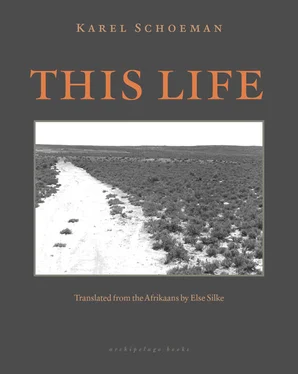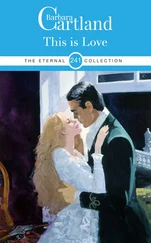Maans was not faring well, for the boy was not happy at school. During the winters he spent with us in the Karoo he sometimes complained to me, and I tried to console him a little or encourage him, and help with his lessons, but he did not find it easy to talk and I never did find out exactly what the problem was. Father might still have given in, for I think he missed the child, but Mother was adamant, and so Maans was sent back to Worcester every time. Later he stopped complaining and I hoped things had improved, but it was only because he was growing up and began keeping things to himself, a grown young boy who had started to shave and was preparing to be confirmed — on that occasion he was given Jakob’s gold watch that Father had kept for him all those years. And then one day there was a letter from Maans that I had to read to Father and Mother as usual, in which he told them he found it too hard to learn and did not want to continue at school, but wished to go to Cape Town to become a soldier; and then Coenraad was dispatched to Worcester in the cart to fetch him, and he returned to the farm.
It meant a lot to Father to have Maans home again, for he was the only grandchild, the namesake and heir, after all, while Coenraad after all the years was no more than a stranger and hireling, and Pieter was incapable of more than a few small, menial tasks. In his unassuming way Maans was a hard worker, however, perhaps a bit slow, but precise and dependable. Jakob and Sofie had both been as bright as mirrors reflecting the light, as sharp as shards of mirror glass on which you could cut your fingers, but Maans showed none of their brightness, the quicksilver surface dull, casting hardly any reflection; actually he mostly took after Father, and Father loved him dearly. He obeyed the instructions he was given and discharged his duties; when we travelled to town, he drove the cart or wagon and in winter he helped Coenraad arrange the trek to the Karoo, and what he really thought or felt, no one ever knew.
It was after Maans’s return from Worcester that Mother ordered the glasses from Cape Town, two dozen crystal glasses and two decanters that were unpacked and put away in our town house, for we were entertaining more and more often when we were in town; twenty-four chairs were lined up against the walls of the big voorhuis, and the elders and deacons were invited over regularly with their wives, and served sweet wine. I remember how the old ladies would inspect the glasses and the decanters, the large sideboard and the new curtains, making an inventory to be discussed at length later. In later years I believe Father would have preferred to stay at home, but nonetheless we went to town regularly for Nagmaal and other services, and entertained the elders and deacons and their wives.
When Maans came of age, however, the entire district was invited to the farm and there was dancing like all those years ago before he was born, when his parents were newly-wed, only this time the festivities were on a larger scale, for much had changed in the meantime and there was greater wealth and a greater need to show it off. I now realise that it was as a tribute to Father, however, and to him alone, that the guests arrived in such large numbers, and not for Maans’s sake — for they scarcely knew him after the years he had spent at school in the Boland — and even less for the sake of our family. If I had not realised before how little regard people in the district had for us, it became quite clear to me that evening where, almost unnoticed in the throng, I happened to intercept, as I always did, the incidental words and phrases, the disparaging glances, the dismissive shrug of the shoulders. Father had earned their respect, and they were willing to enjoy our hospitality and to drink to Maans’s health with the wine we supplied, but this willingness did not imply that they accepted us or felt obliged to us in any way. We were not part of their tight little community with its intermarriages, quarrels, friendships and gossip, relentlessly separated from them by our own persistent arrogance and aloofness and by the rumours that surrounded our family, unmistakably excluded from the inner circle of their fellowship, just as I was excluded from the giggling circle of girls waiting to be invited for a dance, waiting to be asked for their hand in marriage.
The house seemed strange to me with all these people, and hot and stuffy with the tallow candles burning everywhere on the tables, chests and window-sills, and when young Jasper Esterhuysen suddenly appeared before me and asked me something, stuttering with embarrassment, I did not understand what he was saying, and he had to repeat himself before it dawned on me that the music had begun and he was inviting me to waltz. No, no, thank you, I muttered without realising what I was saying, I must take my brother his supper; panic-stricken, I fled to the kitchen and while I was making my way through the people, I saw him return to Tant Mietjie, his mother, who had sent him, to let her know that I did not wish to dance. I remained in the kitchen for a long time: there were only a few servants there who had come with the guests, and old Dulsie, who was being kept awake by the unaccustomed noise. What brother? I asked myself as I remembered the lie I had told Jasper. After all, Jakob was dead and Pieter had left, and I had only been looking for an excuse to escape from him.
For a while I fussed aimlessly at the hearth without listening to the music in the voorhuis, the shuffling of feet and the shouts of the dancers, the laughter of the servants crowded in the doorway. “Jakob fetched himself a wife in the Karoo,” Dulsie suddenly muttered where she dozed in the corner, and I remembered how he had lifted Sofie from the wagon on her arrival, and how she had glowed like a dark flame among the dancers. At the time I had been no more than a child on the fringe of the grown-ups’ company, excited about the guests and the bustle and the noise, about this whole new world I was discovering, but it was over; I would never be a part of it, I knew, never one of the giggling girls invited to dance, never one of the married women against the wall in the voorhuis. Only Jasper Esterhuysen would still totter across the voorhuis floor, hair plastered down with pomade and arranged in curls over his low forehead, and only because old Tant Mietjie had sent him. I was in my thirties, and any possibilities that might have existed for me had passed unnoticed and slipped out of my reach.
I must take Pieter something to eat, I thought, and with some cake and a glass of wine I walked across the yard, past the outspanned carts, to the outside room where he was sitting on his cot in the dark. “Thank you, Sussie,” he said when I handed him the refreshments, for he had learned to address me by that name, but he made no move to take the food, so that I put it on the cot beside him, and after a while I sat down next to him, for I had no desire to return to the house. The door facing the house was open, and across the yard we could see the dimly-lit windows and hear the voices and the music. He sat watching and listening across the distance; did the music bring back memories; did he hear, did he remember, or did no thoughts or memories remain, and was he simply waiting for the time to pass so that he could go to bed? It was impossible to say: no one could still get through to him. In all the years since his return, however, the two of us had never been alone together like that, everyone having forgotten about us that evening, and never before had there been the possibility of intimacy or confidentiality, the possibility of a gesture or a question. What happened? I wanted to ask him; where is Sofie? I wanted to ask, but it was impossible to speak. Thus we sat together in silence for a long time, until the sound of shots being fired and voices cheering outside made me start up, and I realised Mother would be looking for me. When I rose from the cot, Pieter did not look up and when I wished him goodnight, he did not answer immediately, as if he first had to consider my words and return from afar to reply.
Читать дальше












